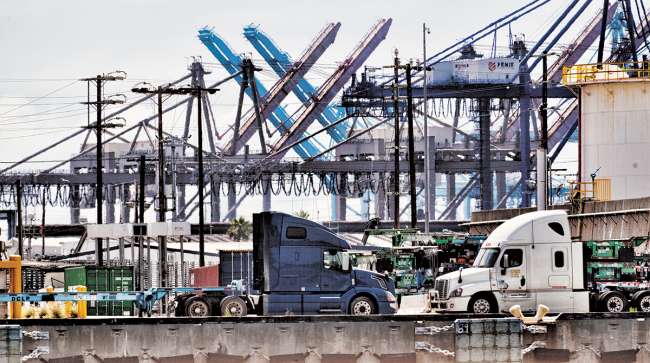Senior Reporter
Federal Maritime Commission Reopens Port Chassis Probe

[Stay on top of transportation news: Get TTNews in your inbox.]
The Federal Maritime Commission has opened a follow-up investigation to determine if ocean shippers are complying with a cease-and-desist order issued earlier this year establishing the right of motor carrier choice in chassis provisioning for merchant haulage in four key U.S. markets.
The commission said it initiated the new investigation June 15 in response to reports that chassis providers in Los Angeles/Long Beach, Chicago, Memphis and Savannah are not complying with the cease-and-desist order, which was issued by the commission on Feb. 13.
“The commission does not currently have reliable assurance that respondents are complying with the cease-and-desist order,” the FMC said.
The investigation announcement stems from an August 2020 complaint filed with the commission by American Trucking Associations’ Intermodal Motor Carriers Conference, which maintained that the “unlawful” arrangement dating to 2006 did not allow motor carriers to choose chassis providers.
“As a consequence of these unlawful practices, ocean carrier respondents have caused motor carriers, their shipping and receiving customers, and ultimately the consuming public, to be overcharged in an amount that [ATA’s] IMCC estimates to be as much as $1.8 billion during the three years prior to the filing of this complaint,” according to the IMCC’s original complaint.
The commission said its new investigation, which will be conducted by its Bureau of Enforcement, Investigations and Compliance, will examine whether the Ocean Carrier Equipment Management Association — a U.S.-based coalition of 10 major ocean common carriers — and its members have altered their policies and practices as required by the February cease-and-desist order.
“After a review of evidence relevant to the inquiry or issue, BEIC may determine whether to recommend an enforcement action,” the commission statement said.
"I’m glad to hear that they’re opening the investigation up,” said Dave Manning, former ATA Chairman and current North American Chassis Pool Chair, told Transport Topics. “Nothing’s changed since the FMC made its ruling. There’s still merchant hauling moves where motor carriers are denied choice at the four locations that FMC said it’s prohibited. Hopefully, it gets cleared up for all parties what it means to allow motor carriers’ choice.”
An official with IMC Logistics, a Collierville, Tenn., intermodal container carrier that services a large number of ports, welcomed the commission’s updated investigation.

Lemm
“There has been no change in Memphis by ocean carriers and their aligned intermodal equipment providers, and we believe the investigation is a good thing to peel this back by taking a harder look at antiquated and unreasonable box-rule practices that have been ordered by the judge to cease and desist,” said Donna Lemm, IMC’s chief commercial officer.
“In Memphis, for example, nearly 30% of our drivers’ time is spent chasing down the right chassis for the right ocean carrier container,” Lemm added. “What a waste of money.”
IMC ranks No. 33 on the Transport Topics Top 100 list of the largest for-hire carriers in North America.
In a statement, OCEMA has indicated that shippers are in the process of changing the way ocean carriers are dealing with the chassis issue, but that it’s clear “this process will take some time to fully develop.”
However, the commission has said the requirement calls for immediate compliance from the shippers. “There was no grace period, and to the extent that respondents have not modified their conduct to conform to the order, they are in violation of the Shipping Act and the cease-and-desist order,” the commission said.
Jonathan Eisen, executive director of the ATA IMCC, characterized the earlier ruling by the commission as a “win” for the industry.
Want more news? Listen to today's daily briefing above or go here for more info
“This victory has been a long time coming,” Eisen said earlier this year. “The decision is the first step in putting a stop to the practice of foreign-owned shipping lines forcing American drivers and motor carriers to use specific equipment providers to move goods — which will help reduce supply chain delays and cut costs for carriers and consumers.”
Eisen declined comment on the follow-up investigation.
IMCC filed its complaint against OCEMA, Consolidated Chassis Management and the world’s largest ocean carriers with the commission in 2020, alleging — among other things — that they have denied motor carriers the ability to choose their provider when leasing this essential equipment, heaping unjust and unreasonable prices upon trucking companies.




